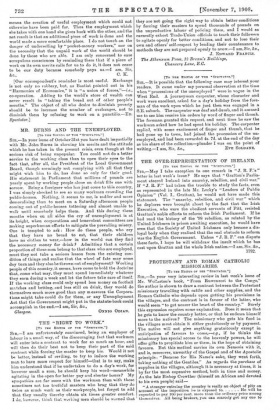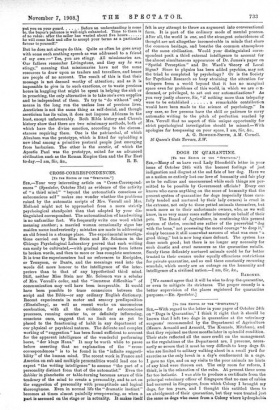PROTESTANT AND ROMAN CATHOLIC MISSIONARIES.
[To TER EDITOR OP TEE " SPECT&TOR."1
Stu,—Tn your very interesting review in last week's issue of Mr. Wollaston's book, "From Ruwenzori to the Congo," the author is shown to draw a contrast between the Protestant missionary travelling with cattle and other supplies, and the Roman Catholic who depends upon getting his provisions in the villages, and the contrast is in favour of the latter, who
would seem "to get nearer the heart of the country." Surely this expression requires some explanation. Does it mean that he gets to know the country better, or that he endears himself more to the natives P The missionary who gets his food in
the villages must obtain it either gratuitously or by payment. The native will not give anything gratuitously except in anticipation of favours to come,—e.g., if he thinks the missionary has special access to the heavenly powers, be will offer gifts to propitiate him or them, in the hope of obtaining favours. But this method carries its own Nemesis with it, and is, moreover, unworthy of the Gospel and of the Apostolic principle: "Because for His Name's sake, they went forth, taking nothing of the Gentiles." As regards the purchase of supplies in the villages, although it is necessary at times, it is by far the most expensive method, both in time and money. As the late Bishop Crowther (himself an African and devoted to his own people) said- " A stranger entering the country is really an object of pity on
account of the imposition he is exposed to He will be expected to pay 100 per cent. more than the ordinary prico among themselves. All being brokers, you can scarcely get any one to
put you on your guard Before an understanding is come to, the buyer's patience is well-nigh exhausted. Time to them is of no value: after the seller has wasted about five hours he will come back and offer to accept your terms as a particular favour to yourself."
But he does not always do this. Quite as often he goes away with some such scathing speech as was addressed to a friend of my own:—" Yes, you are stingy. All missionaries are.
Our fathers remember Livingstone, and they say he was stingy," meaning that missionaries have not the same resources to draw upon as traders and travellers, and hence are people of no account. The result of this is that their message is not deemed worthy of attention; and as it is impossible to give in to such exactions, or to waste precious hours in haggling that might be spent in helping the sick or in preaching, the only alternative is to take one's own supplies
and be independent of them. To try to "do without" only means in the long run the useless loss of precious lives. Asceticism is not the same thing as self-denial, and though asceticism has its value, it does not impress Africans in the least, except unfavourably. Both Bible history and Church history show that there are two missionary methods, both of which have the divine sanction, according to the circum- stances requiring them. One is the patriarchal, of which Abraham was the prototype, which is fitted for upholding a new ideal among a primitive pastoral people just emerging from barbarism. The other is the ascetic, of which the Apostle Paul was the prototype, suited for an advanced civilisation such as the Roman Empire then and the Far East





























































 Previous page
Previous page